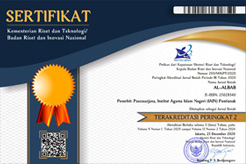A Conceptual Framework of Distributive Justice in Islamic Economics
Abstract
Keywords
Full Text:
PDFReferences
A.H.M. Sadeq., 1989. “Factor Pricing and Income Distribution From an Islamic Perspective.” Journal of Islamic Economics, Vol. 2, No.1, pp. 45-53.
Abdel Hamid El-Ghazali.,1994. “Man is the Basis of Islamic Strategy for Economic Development.” Islamic Economics Translation Series. No.1 by IRTI.
Abdul Azim Islahi., 2004. Contributions of Muslim Scholars to Economic Thought Analysis (11-905 A.H./632-1500 A.D.). Islamic Economic Research Center, King Abdul Aziz University, Jeddah, Saudi Arabia.
Ahmed, Habib.,2004. Role of Zakat and Awkaf in Poverty Alleviation. IDB (IRTI). Occasional Paper. No.8.
Azizi Che Seman & Nor Aini Ali., 2004. “Economic Thoughts of Redistribution of Income dan Wealth: A Comparative Analysis.” Shariah Journal, 12:2 , pp. 25-42.
English-Quran with commentaries by Yusuf Ali: The Meaning of The Noble Qur’an., 2006. (source: http://www.pdf-koran.com/Koran.pdf).
Fleurbaey, M., 2012. Economics and Economic Justice, The Stanford Encyclopedia of Philosophy (Summer 2012 Edition), Edward N. Zalta (ed.).
Haneef, M. A., 1995. Contemporary Islamic Economic Thought: A selected Comparative Analysis. Kuala Lumpur: Ikraq.
Islahi, A. A., 1993. “Islamic Distributive Scheme: A Concise Statement.” Journal of Objective Studies. Vol.5, No. 1. 98-111.
Khaliq Ahmad & Arif Hassan., 2000. “Distributive Justice: The Islamic Perspective.” Intellectual Discourse, Vol 8, No 2, 159-172.
Mannan, M. A., 1984. The Frontiers of Islamic Economics: Some Philosophical Underpinnings.
M. Fahim Khan., 1990. “Factors of Production and Factor Markets in Islamic Framework.” JKAU: Islamic Econ, Vol. 2, pg. 25-46. (Source: http://www.kau.edu.sa/Files/320/Researches/51020_21157.pdf).
M. N. Siddiqi, 1986. Guaranteeing a Minimum Level of Living in an Islamic State. In Distributive Justice and Need Fulfilment in an Islamic Economy, ed. by Munawar Iqbal. Islamabad: International Institute of Islamic Economics.
M. Quraish Shihab., 1996. Wawasan Al-Quran: Tafsir Tematik atas Pelbagai Persoalan Umat
M. Umer Chapra., 1992. “Islam and the Economic Challenge.” Islamic Economics Series – 17. The Islamic Foundation The International institute of Islamic Thought.
M. Umer Chapra., 2007. Guarantee of Satisfaction of Fundamental Needs. Encyclopedia of Islamic Economics.
Mabid Ali Al- Jarhi., 1985. “Towards an Islamic Macro Model of Distribution: A Comparative Approach.” JRIE, Vol. 2, No. 2, pg. 3-29.
Majid Khadduri., 2001. The Islamic Conception of Justice. Publisher JHU Press (reprint).
Monzer Kahf., 2002. “Allocation of Outputs to Factors of Production and the Implicit Islamic concept of Market Justice.” Seminar on the Theory of Functional Distribution of Income, Lawrence, Kansas. Organized by IRTI.
Noor Mohammad Ghifari., 1982. Social Secury System in Islam. PhD Thesis. Punjab University, Lahore.
Siddidui, Nejatullah., 1988. Role of the State in the Economy The Islamic Foundation, Leicester, U.K.pp. 255.
Zubair Hasan., 1988. Distributional equity in Islam. Published in: Munawar Iqbal ( Ed.): Distributive justice and need fulfillment in an Islamic Economy (1988): pp. 35-62.
Zubair Hasan., 2008. “Markets and the role of government in an economy from Islamic perspective.” (Source: http:// http://mpra.ub.uni-muenchen.de/12233/)
Article Metrics
 Abstract views: 3620
Abstract views: 3620
 PDF views: 2993
PDF views: 2993











